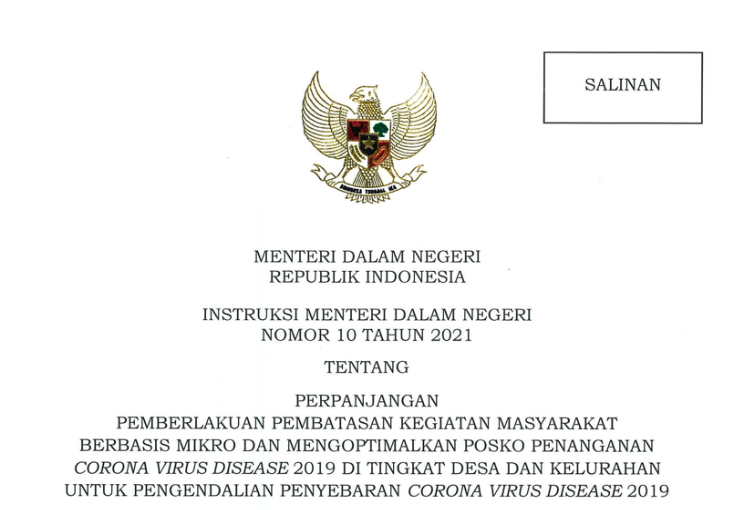Gov’t Issues Instruction on Implementation of Micro-Scale Restrictions in 30 Provinces

The Government has decided to extend the implementation of micro-scale activity restrictions (PPKM Mikro) from 4 May to 17 May 2021.
The policy is stipulated in Instruction of Minister of Home Affairs Number 10 of 2021 on Extension of Micro-Scale Activity Restrictions and Optimizing COVID-19 Handling Post at Village and Sub-District Level to Control the Spread of COVID-19, which was issued on 3 May 2021.
The Government has decided to impose micro-scale activity restrictions on five more provinces, namely Riau Islands, Bengkulu, Central Sulawesi, Southeast Sulawesi and West Papua.
In the previous period, the micro-scale activity restrictions had been implemented in 25 provinces, namely Jakarta, Banten, West Java, Yogyakarta, Central Java, East Java, Bali, North Sumatra, East Kalimantan, South Sulawesi, North Sulawesi, South Kalimantan, Central Kalimantan, East Nusa Tenggara, West Nusa Tenggara, Aceh, Riau, South Sumatra, North Kalimantan, Papua, West Sumatra, Jambi, Bangka Belitung Islands, Lampung, and West Kalimantan.
“The scope of the restrictions includes Provinces and Regencies/Cities that have mortality rate above the national mortality rate, recovery rate below the national recovery rate, active cases rate above the national active cases rate, Bed Occupancy Ratio/BOR for Intensive Care Unit (ICU) and isolation rooms above 70 percent, and positivity rate above 5 percent,” Minister of Home Affairs Tito Karnavian said.
The provisions on restrictions and the determination of the green, yellow, orange, and red zones will be based on the previous provisions on the micro-scale activity restrictions.
Minister of Home Affairs also appealed to regional heads to take several measures to prevent the transmission of COVID-19 during the fasting month of Ramadan and during Eid al-Fitr period.
“Governors and Regents/Mayors shall disseminate the Government’s policy to ban mudik (annual exodus in the period of Eid al-Fitr) and related sanctions in accordance with the provisions of laws and regulations to the residents in their respective areas,” the Minister states.
Under the Instruction, regional heads were also asked to intensify the use of face masks and enforce the policy for wearing the face masks, as well as to prevent mass gathering in their respective areas.
The Minister also ordered regional heads to control community activities in public facilities/tourist attractions/parks by implementing the obligation to implement antigen/GeNose test screening for paid facilities/indoor tourist attractions and strict application of health protocols for public facilities/outdoor tourist attractions. For the orange and red zones, community activities in public facilities/ tourist attractions/parks are prohibited.
In addition, regional heads are also ordered to monitor the entry of Indonesian migrant workers in coordination with relevant stakeholders.
“The Government Agencies in the field of transportation and the local public order agency (Satpol PP), along with the Indonesian National Defense Forces (TNI) and the Indonesian National Police (Polri), should strengthen control and monitor people mobility at checkpoints in their respective areas during the fasting month of Ramadan, and before and after the Eid al-Fitr,” Minister of Home Affairs stated.
The Minister also called on relevant stakeholders to prevent public activities that may disrupt public order and security, and prevent crowds in public facilities, entertainment facilities, tourist attractions and places of worship during Ramadan and Eid al-Fitr celebration, as well as to anticipate potential for natural disasters.
Stakeholders in agriculture and trade are to take more intensive measures to maintain price stability (especially for food prices), and ensure the smooth distribution of food to and from market locations, the Instruction reads.
“Regional governments may issue policies in imposing special criteria and requirements during Ramadan, and before and after Eid al-Fitr, provided that they do not violate provisions in regulations/guidelines issued by the relevant Government Ministries/Agencies and the COVID-19 Task Force,” Tito added.
“The implementation of the micro-scale activity restrictions is extended from 4 May 2021 to 17 May 2021, and the expiration of the restrictions policy will be considered based on the progress achieved in the five parameters in 16 consecutive weeks. Regional heads must periodically conduct monitoring and coordinating meetings with all relevant stakeholders,” Minister of Home Affairs said. (PR of Ministry of Home Affairs/UN) (RI/MUR)








